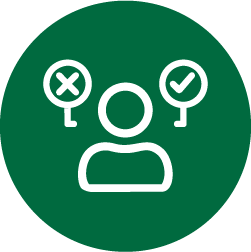The Heart of Barber National Institute
Vision
A world where people of all abilities belong and reach their full potential
Mission
We are guided by compassion, innovation, and an unshakeable belief in human potential. We work every day to help make dreams come true for people of all abilities.
Guiding Philosophy
At Barber National Institute, we believe all individuals are people of God with feelings, emotions, needs, and capabilities unique to these persons and their heritage. We are guided by the enduring values of faith, hope, and love, which shape our relationships, inspire our work, and sustain our belief in the potential of every individual. We believe that greatness is achieved through continuous learning and a deep commitment to those we serve and to one another. Our staff are the heart of our mission – their dedication, compassion, and skills drive our daily impact. We strive for continued quality improvement and seek to enhance the forward-thinking culture of excellence as our professionals practice at the highest level of expertise.
Corporate Values
Respect for All People
We encourage and embrace a caring environment that fully supports persons of diverse backgrounds, abilities, and needs. Our person-centered approach is founded on the belief that building a relationship begins with establishing trust in each other.
Integrity
We conduct all our affairs in a professional, transparent, and ethical manner. Our steadfast commitment to maintaining an honest, fair, and confidential workplace allows us to trust one another and to hold ourselves accountable to realize our vision.
Quality and Excellence
We are visionary leaders who take pride in professional growth by proactively developing our knowledge and becoming experts in our field.
Teamwork
We work together to fulfill our vision: a world where all people belong and reach their full potential. We respect and build an environment dedicated to cooperation, acceptance of diverse opinions, and open and honest communication.
Compassion
We desire to enhance the quality of life of those we serve, conveyed by feelings of care and nurturing, with a focus on the innate value, beauty, and ability of everyone.

Informed Decision Making
We believe that excellence is achieved through a commitment to continuous learning. We use evidence-based practices to inform decisions, measure progress, and innovate in ways that enhance the lives of those we serve.
Our Core Commitments

- Accountable Performer – We focus on achieving goals and delivering high quality results.
- Insightful Thinker – We evaluate information, challenge assumptions, and consider multiple perspectives before acting.
- Transparent Communicator – We share information openly and clearly with honesty and respect; we avoid gossip.
- Problem Solver- We ask questions; we identify root causes, explore options, and implement effective solutions.
- Technical Expert Contributor – We apply job-specific knowledge, procedures, and tools; we maintain accuracy, compliance, and quality service standards.
- Change Navigator – We maintain focus and adapt to change with resilience and clarity; we guide change transitions with empathy.
- Authentic Relationship Builder – We encourage others in a respectful way, promoting trust, and mutual understanding.
- Growth Contributor – We work to develop our own and my team’s knowledge and skills; we support a learning environment where others can ask questions and continuously learn.

